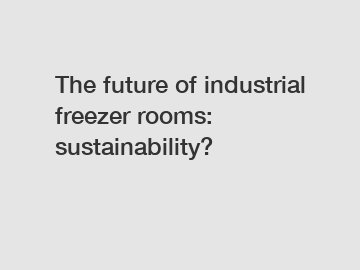Your Position: Home - Refrigeration & Heat Exchange Equipment - The future of industrial freezer rooms: sustainability?
Industrial freezer rooms have long been essential for food processing, storage, and distribution. These large, efficient units are the backbone of many industries, ensuring that products are kept at the required temperatures to maintain their quality and safety. However, as the world becomes increasingly focused on sustainability and reducing environmental impact, the future of industrial freezer rooms is being questioned. Can these essential units adapt to meet the growing demand for sustainability? This article will explore the challenges and opportunities facing the future of industrial freezer rooms, with a focus on sustainability.
Challenges in sustainability.
One of the main challenges facing the future of industrial freezer rooms is their energy consumption. These units require a significant amount of energy to operate, which can have a negative impact on the environment. In addition to the energy consumption, industrial freezer rooms also produce a large amount of heat, which can contribute to urban heat islands and increase energy use for air conditioning in surrounding buildings.

Another challenge is the refrigerants used in industrial freezer rooms. Many of these units rely on synthetic refrigerants that are potent greenhouse gases and contribute to global warming. As the world moves towards phasing out these harmful substances, industrial freezer rooms will need to switch to more sustainable alternatives.
Opportunities for sustainability.
Despite these challenges, there are opportunities for industrial freezer rooms to become more sustainable. One key opportunity lies in the use of natural refrigerants. These refrigerants, such as ammonia, CO2, and hydrocarbons, have a much lower environmental impact than synthetic refrigerants. By transitioning to natural refrigerants, industrial freezer rooms can significantly reduce their carbon footprint and environmental impact.
Another opportunity for sustainability lies in the design of industrial freezer rooms. By optimizing the layout, insulation, and airflow of these units, companies can reduce energy consumption and improve efficiency. Additionally, incorporating energy-efficient technologies, such as thermal storage and heat recovery systems, can further enhance sustainability.
Furthermore, the use of renewable energy sources, such as solar or wind power, can help industrial freezer rooms reduce their reliance on fossil fuels and further decrease their environmental impact. By combining renewable energy sources with energy-efficient technologies and natural refrigerants, industrial freezer rooms can become more sustainable and environmentally friendly.
Conclusion.
In conclusion, the future of industrial freezer rooms hinges on their ability to adapt to meet the growing demand for sustainability. While there are challenges, such as energy consumption and refrigerant use, there are also opportunities to improve sustainability through the use of natural refrigerants, energy-efficient technologies, and renewable energy sources.
By embracing these opportunities and making the necessary changes, industrial freezer rooms can reduce their environmental impact, decrease their carbon footprint, and contribute to a more sustainable future. As industries continue to prioritize sustainability, it is crucial for industrial freezer rooms to evolve and innovate to meet these changing demands.
Contact us.
If you are interested in learning more about sustainable solutions for industrial freezer rooms, please contact us. Together, we can work towards a more sustainable future for industrial refrigeration.
If you want to learn more, please visit our website cold room for fruits, air cooled scroll condensing units supplier, air-cooled hermetic compressor unit.
228
0
0
Comments
All Comments (0)